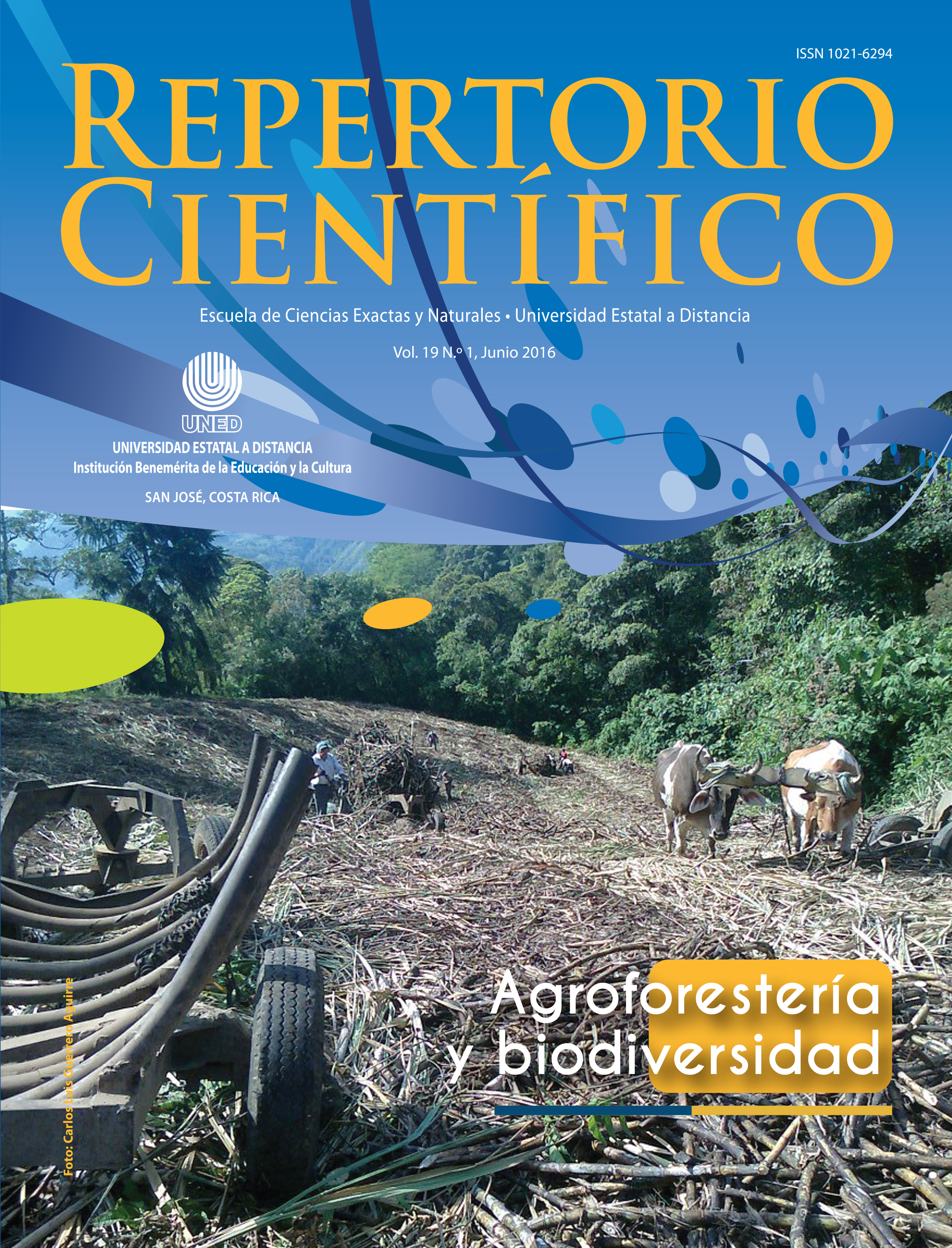Interacciones del microbioma intestinal humano
Palabras clave:
Microbioma, Interacción, sistema inmune entérico, probióticoResumen
El microbioma intestinal tiene múltiples implicaciones en la salud del hospedero, desde que nacemos estos microorganismos juegan un papel fundamental en la maduración del sistema inmune entérico y su reconocimiento entre los microorganismos patógenos y comensales. Además de ello, la microbiota influye en la digestión del hospedero otorgándoles a éstos un mayor poder digestivo y por otro lado ejercen influencia en el Sistema Nervioso Central por medio de diversas vías de comunicación.
Citas
BAILEY, M., DOWD, S., GALLEY, J., HUFNAGLE, A., ALLEN, R. Y LYTE, M. 2011. Exposure to a social stressor alters the structure of the intestinal microbiota: implications for stressor-induce immunodulation. Brain Behavior and Immunity. 25: 297-407.
CHERRIEL, M. Y EBERL, G. 2012. The development of LTi cells. Current Opinion in Inmunology. 24: 178-183.
CRYAN, J. Y DINAN, T. 2012. Mind-altering microorganisms: the Impact of the gut microbiota on brain and behavior. Nature Neuroscience. 13: 701-712.
DESBONNET, L., GARRETT, L., BIENENSTOCK, J. Y DINAN, T. 2008. The probiotic Bifidobacterium infantis: an assessment of potential antidepressant properties
in the rat. Journal of Psychiatric Research. 43: 164-174.
KARLSOSON, C., MOLIN, G., CILIO, C. Y AHRNE, S. 2011. The pioneer gut microbiota in human neonates vaginally born at term-a pilot study. Pediatric Research. 70: 282-286.
LOZUPONE, C., STOMBAUGH, J., GORDON, J., JANSSON, J. Y KNIGHT, R. 2012. Diversity, stability and resilience of the human gut microbiota. Nature. 489: 220-230.
MASLOWSKI, K., VIEIRA, A., NG, A., KRANICH, J., SIERRO, F., YU, D., SCHILTER, S., ROLPH, M., MACKAY, F., ARTIS, D., XAVIER, R., TEIXEIRA, M. Y MACKAY, C. 2009. Regulation of inflammatory responses by gut microbiota and chemoattractant receptor GPR43. Nature. 461: 1282-1286.
MAYER, E. 2011. Gut feelings: the emerging biology of gut-brain communication. Nature Review Neuroscience. 12: 453-466.
MAYNARD, C., ELSON, C., HATTON, R., Y WEAVER, C. 2012. Reciprocal interactions of the intestinal microbiota and immune system. Nature. 489: 231-240.
PRAWITT, J., ABDELKARIM, M., STROEVE, J., POPESCU, I., DUEZ, H., VELAGAPUDI, V., DUMONT, J., BOUCHAERT, E., DIJK, T., LUCAS, A., DORCHIES, E., DAOUDI, M., LESTAVEL, S., GONZALEZ, F., ORESIC, M., CARIOU, B., KIUPERS, F., CARON, S. Y STAELS, B. 2011. Farsenoid X receptor deficiency improves glucose homeostasis in mouse models of obesity. Diabetes. 60: 1861-1871.
PUIG, R., CANO, J., CASTELLOTE, C., FRANCH, C. Y CASTELL, M. 2008. El intestino: pieza clave del sistema inmunitario. Revista Española de Enfermedades Digestivas. 100: 29-34.
RAUTAVA, S., LUOTO, R., SALMINEN, S. Y ISOLAURI, E. 2012. Microbial contact during pregnancy, intestinal colonization and human disease. Nature Gastroenterology and Hepatology. 10: 565-576.
TOOL, P. Y COOEY, J. 2008. Probiotic bacteria influence the composition and function of the intestinal microbiota. Interdisciplinary Perspectives on Infectious
Disease. Doi:10.1155/2008/175285.
TREMAROLI, V. & BÄCKHED, F. 2012. Functional interactions between the gut microbiota
CHERRIEL, M. Y EBERL, G. 2012. The development of LTi cells. Current Opinion in Inmunology. 24: 178-183.
CRYAN, J. Y DINAN, T. 2012. Mind-altering microorganisms: the Impact of the gut microbiota on brain and behavior. Nature Neuroscience. 13: 701-712.
DESBONNET, L., GARRETT, L., BIENENSTOCK, J. Y DINAN, T. 2008. The probiotic Bifidobacterium infantis: an assessment of potential antidepressant properties
in the rat. Journal of Psychiatric Research. 43: 164-174.
KARLSOSON, C., MOLIN, G., CILIO, C. Y AHRNE, S. 2011. The pioneer gut microbiota in human neonates vaginally born at term-a pilot study. Pediatric Research. 70: 282-286.
LOZUPONE, C., STOMBAUGH, J., GORDON, J., JANSSON, J. Y KNIGHT, R. 2012. Diversity, stability and resilience of the human gut microbiota. Nature. 489: 220-230.
MASLOWSKI, K., VIEIRA, A., NG, A., KRANICH, J., SIERRO, F., YU, D., SCHILTER, S., ROLPH, M., MACKAY, F., ARTIS, D., XAVIER, R., TEIXEIRA, M. Y MACKAY, C. 2009. Regulation of inflammatory responses by gut microbiota and chemoattractant receptor GPR43. Nature. 461: 1282-1286.
MAYER, E. 2011. Gut feelings: the emerging biology of gut-brain communication. Nature Review Neuroscience. 12: 453-466.
MAYNARD, C., ELSON, C., HATTON, R., Y WEAVER, C. 2012. Reciprocal interactions of the intestinal microbiota and immune system. Nature. 489: 231-240.
PRAWITT, J., ABDELKARIM, M., STROEVE, J., POPESCU, I., DUEZ, H., VELAGAPUDI, V., DUMONT, J., BOUCHAERT, E., DIJK, T., LUCAS, A., DORCHIES, E., DAOUDI, M., LESTAVEL, S., GONZALEZ, F., ORESIC, M., CARIOU, B., KIUPERS, F., CARON, S. Y STAELS, B. 2011. Farsenoid X receptor deficiency improves glucose homeostasis in mouse models of obesity. Diabetes. 60: 1861-1871.
PUIG, R., CANO, J., CASTELLOTE, C., FRANCH, C. Y CASTELL, M. 2008. El intestino: pieza clave del sistema inmunitario. Revista Española de Enfermedades Digestivas. 100: 29-34.
RAUTAVA, S., LUOTO, R., SALMINEN, S. Y ISOLAURI, E. 2012. Microbial contact during pregnancy, intestinal colonization and human disease. Nature Gastroenterology and Hepatology. 10: 565-576.
TOOL, P. Y COOEY, J. 2008. Probiotic bacteria influence the composition and function of the intestinal microbiota. Interdisciplinary Perspectives on Infectious
Disease. Doi:10.1155/2008/175285.
TREMAROLI, V. & BÄCKHED, F. 2012. Functional interactions between the gut microbiota
Descargas
Publicado
2016-06-08
Cómo citar
Montero García, M. . (2016). Interacciones del microbioma intestinal humano. Repertorio Científico, 19(1), 85–88. Recuperado a partir de https://revistas.uned.ac.cr/index.php/repertorio/article/view/2538
Número
Sección
Cápsulas Científicas
